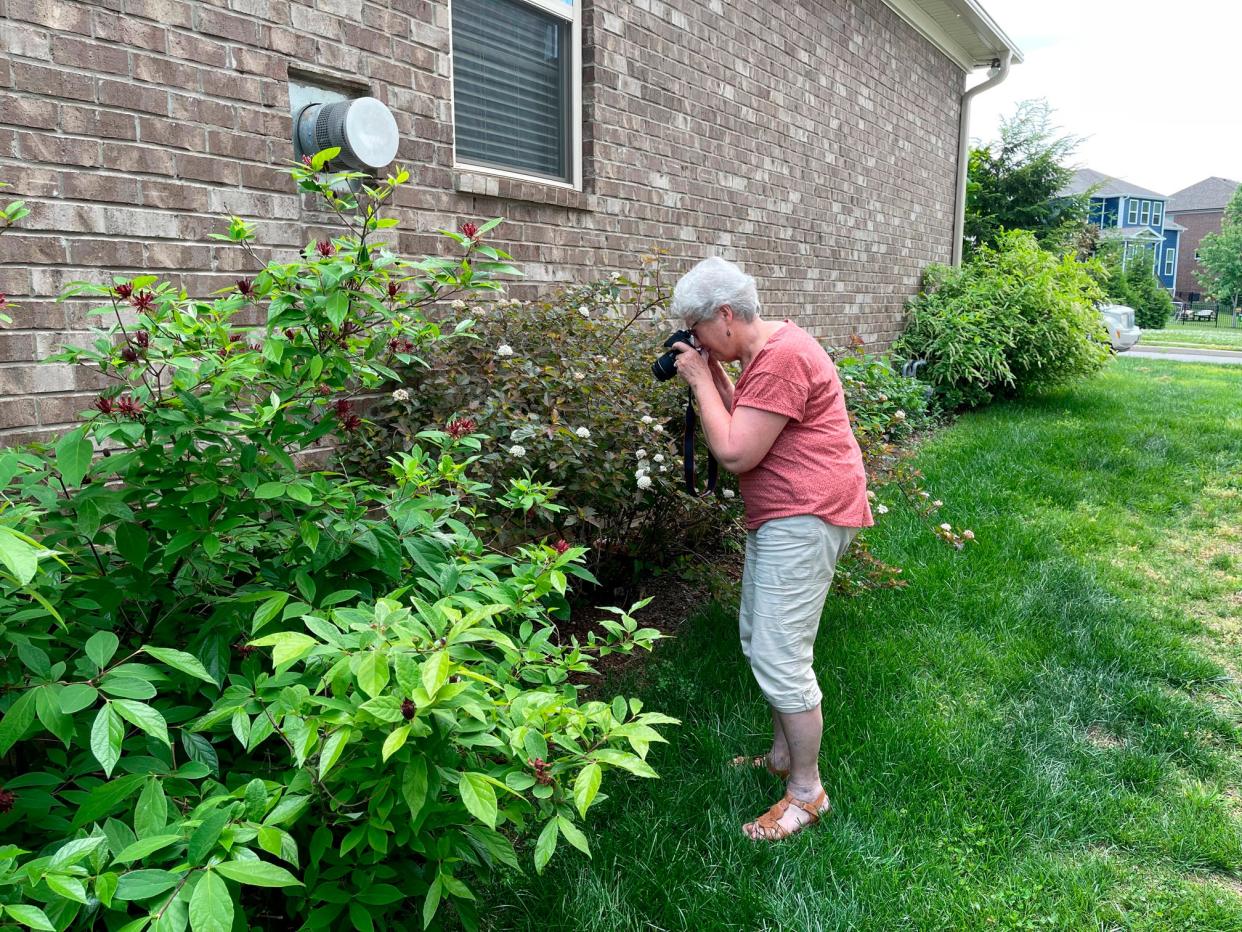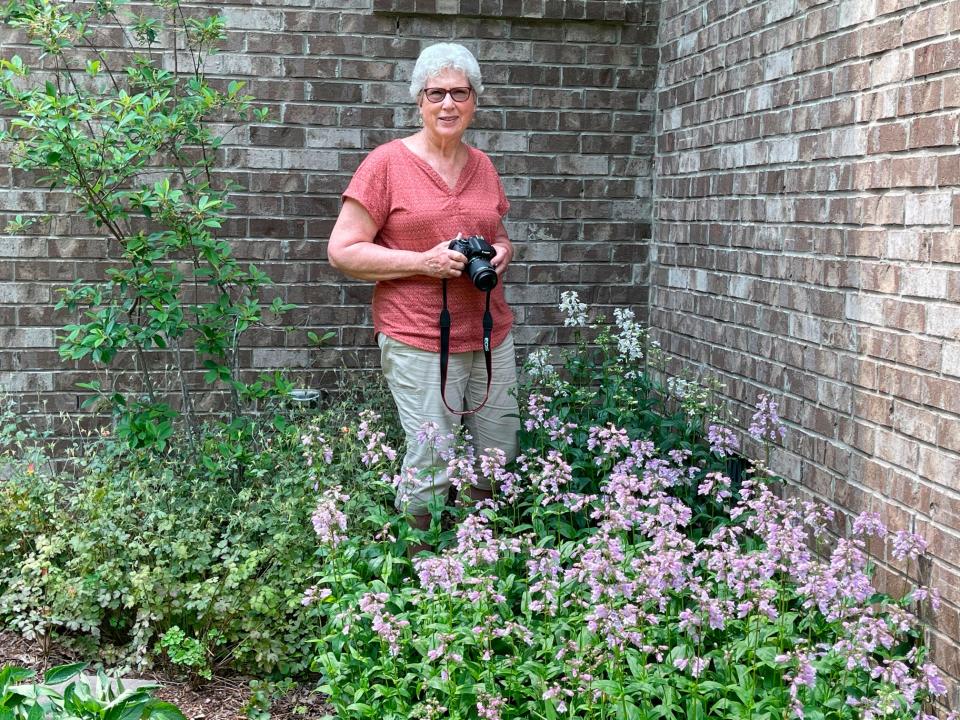Why you don't want to cross the Tennessee Native Plant Society | The Type Set

She has flowers in her blood.
Karen Hill's great grandfather Peter Murray came to the United States from Scotland and designed the formal garden at Niagara Falls.
Hill learned gardening from her grandmother Agnes Selby, whose family farm in Maryland was filled with colorful gladiolas, lilacs and forsythia.
"People ask me if she had a green thumb," Hill said. "She had green hands. She could take a twig, plop it down somewhere and you would get a beautiful plant."
Hill, a former science teacher, is now the president of the Tennessee Native Plant Society, which has 500 members. She's 75 years old and lives in Thompson's Station. She and I have exchanged letters and recently discovered we live only a few blocks from each other.
To meet her and walk with her around her garden is to get an education. She's moving a bit slower these days after three bouts with Lyme disease. She's hiking through plant life so much, she's vulnerable to ticks. She said she once discovered 100 tick bites on her calves and ankles.
"They won't stop me," she said.
The Type Set: He stole his mother's wedding ring to buy drugs. Now a former addict dreams of earning freedom
Music City baseball effort: Hey Dave Stewart, please get it right | The Type Set
Incredible backyard garden
Native plants, she explained, don't need care. They grow naturally in Middle Tennessee's environment. She walked me through her garden of Black-eyed Susans, Copper Irises, Blue-eyed Grass, Beard Tongues and Black Chokeberries.
She has 125 native species growing on her property. All of them would be growing wild in this area with or without her.
However, Hill tells me, in the world of native plants there is a problem ... people.
"Most people don't know a lot," she said. "They don't understand the damage they do to the environment."
In their effort to get the greenest lawns, they use fertilizer filled with chemicals. In an effort to get rid of weeds, they use chemical weed killers.

Chemicals are villains to the members of the Native Plant Society.
"Fertilizer kills our earthworms," she said. "Chemicals kill our bees. We're losing our fireflies. If you don't have bees, you don't have plants. If you don't have insects, what are the birds going to eat?"
On weekends, the Native Plant Society members meet for hikes all around Tennessee.
In the central basin (what we call Middle Tennessee) they hike through cedar glades where they see Tennessee Cone Flowers and Nashville Bread Root. Hill's favorite thing to spot is a Pink Lady Slipper Orchid.
Tennessee Cone Flowers were recently on the endangered species list (they've recently come off). The bottom line: We need more of them to protect our ecosystem.
"I'm trying to do my part to save the world," Hill said.
Mountain mint is her favorite
She likes to point out that her maiden name was Ripple. And she wants to be the ripple in a metaphorical pond that makes an impact on her environment.
Hill let me in on a little secret. She's about to start a beef in the neighborhood where she lives. Her homeowners association recommends growing a plant called Burning Bush around local suburban homes.
Burning Bush turns a beautiful red color in the fall. However, it produces berries that kill birds (and are dangerous for dogs).
"They are going to get a letter," she said with a smile. She tries to win battles without anger or finger pointing. A twinkle in her eye is her best weapon.
She shows me her favorite plant on her property: the Mountain Mint. It produces white and pink flowers.
"Just beautiful," she said. "And aromatic."
She takes me into her garage and grabs a trowel. She leads me back to her garden, where she bends and scoops up two sprigs of native plants.
She hands me small pieces of red and yellow Wild Columbine and purple Rose Verbena for my garden.
She tells me what I need to know about native plants. The first year, they sleep. The second year, they creep. The third year, they run.
I've got the perfect new home for these native plants. My garden is flourishing. I don't know how this is happening. I have as much skill in gardening as I do in ice skating. Miraculously, my roses from last year have multiplied. They're thicker than I could have imagined.
And I don't use chemicals.
Reach Keith Sharon at 615-406-1594 or ksharon@tennessean.com or on Twitter @KeithSharonTN.
Want to read more stories like this? A subscription to the Tennessean gets you access to The Type Set column and other stories important to your community, plus unlimited access to all the latest news throughout the entire USA TODAY Network.
Project 88
This story is part of Project 88, which is named for the 88 characters produced on a Smith-Corona typewriter. The Tennessean’s Keith Sharon types letters on his 1953 typewriter and mails them to people all over the world with an envelope and stamp so they can write back. This story originated with a letter Keith received. The question Project 88 is trying to answer is: Will people communicate the old-fashioned way, through heartfelt letters about the best and most challenging days of their lives. This project is not for political rants, and any kind of snail mail letter (typed, hand-written or computer printout) is acceptable. Please include a phone number.
You can be part of Project 88 by writing to:
Keith Sharon
The Tennessean
1801 West End Ave.
16th Floor
Nashville, TN 37203
This article originally appeared on Nashville Tennessean: Tennessee Native Plant Society tries to protect environment, educate

